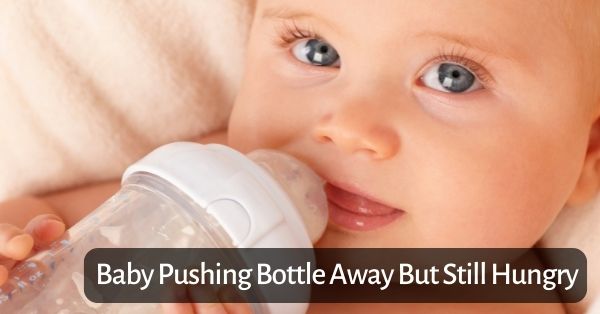You sure do find it frustrating when your newborn refuses to take the bottle while he’s still hungry. Because of that, he’s crying his entire world, and it starts to get on your nerves. And that might make you feel like a terrible mother.

Baby Fights Bottle but Hungry- Why?
Sometimes your baby kicking legs while bottle feeding, or sometimes even the baby plays with bottle instead of eating; and because of these, he’s crying his entire world, and it starts to get on your nerves. And that might make you feel like a terrible mother.
There could be many reasons for your baby baby crying when feeding bottle or reacting similar, like maybe your baby isn’t really hungry or he’s teething or many things. You just have to figure out the baby’s feeding cues by observing him.
If your baby pushes bottle away while they hungry, chances are high that they are just experimenting with food habit, and you have multiple ways to figure out with trying to feed with different angle, try different nipple, and other brands.
Baby Pushing Bottle Away but Still Hungry: 9 Possible Reasons
1. Full Baby
One of the most common reasons your baby fights bottle but hungry is that he’s full. You are probably reading his cues wrong. Babies have an active sucking reflex. Sometimes they just want to suck on something because of tiredness, boredom, discomfort, or soothing effect.
So, your baby might take a bottle willingly to suck on the nipple but will push it away after a little while because he doesn’t want to eat.
2. Position And Atmosphere
A baby’s feeding position and atmosphere both are pretty important factors in bottle feeding. The way you hold a baby while feeding has to be comfortable for the baby. If your way of holding is not okay, then your baby might refuse to take the bottle. This is one of the most common reasons your baby cries halfway through bottle, or refuse and fights.
Then again, babies are very reflexive. They respond to any kind of noise, even while they are eating. So, if you are feeding your baby in a noisy room, your baby might be distracted again and again and will push the bottle away.
3. Baby Fights Bottle But is Hungry Could be Teething Issue
The teething period puts your baby in extreme gum discomfort. That time, sucking gives them relief from that pain, and that might make them take a bottle even if they are not hungry. So when you see your baby not swallowing milk from bottle or pushing the bottle away, check on this.
4. Breastfeeding To Bottle-Feeding Transition
When breastfed babies are just starting bottle feeding, then it might be hard at first and make them reluctant to take a bottle. It takes them some time to get used to bottle feeding.
Breast milk is the best thing out there, and your baby knows it too. And it can be harder for exclusively breastfed babies.
Another major factor here, breastfeeding keeps the baby close to his mother and gives him a sense of security and comfort. So the transition from breastfeeding to bottle-feeding can be very hard at times.
5. Nipple Size Conundrum
Sometimes bottle-fed babies also refuse to take the bottle because of the wrong nipple size. Bottle nipples come in different shapes and size like pacifiers, and you should go for breastfeeding-friendly sizes. Nipple flow is another factor to take into consideration.
Faster milk flow can be difficult for a baby. Babies can be overwhelmed by little things, even if you think it’s not that big a deal. We adults sometimes can’t get on with little troubling things in our lives.
6. Wrong Temperature
Sometimes baby cries halfway through bottle or refuse it due to wrong room temperature. If the temperature of the formula isn’t soothing, then it might be the reason behind your baby’s bottle refusal. Breastfed babies are used to body temperature milk, and that’s why warmer or colder milk might make your baby reluctant to drink milk from the bottle.

6. Taste Of The Formula
Your baby’s denial to take a bottle can be a reason for not liking the taste of the formula. Breast milk and formula taste very different. So, it’s possible your baby may not like the formula you bought for him. You might want to try a different one or feed pumped-out breast milk.
7. Too Young To Be Bottlefed
When you notice baby fights bottle but hungry, take into account of baby’s age too. If your baby is born prematurely, then that might be the reason he can’t take a bottle. Babies don’t perceive the sucking instinct until 36 weeks. So, if your baby is born before 36 weeks, then he can’t even be breastfed or bottle-fed.
In these early stages, they need to be fed with a pipe down their nose, so the formula reaches directly to their stomach.
9. Check For Physical Discomfort
Keep a close look on your baby to see if he’s developing any physical discomfort after drinking milk. If your baby is allergic to milk, then he might show symptoms of stomach pain, spitting up, crying, and eczema on the skin.
Check baby’s mouth, too, because sometimes baby pushes bottle out with tongue because they have blisters in their tongue or mouth. Some babies kick legs while bottle feeding due to physical discomfort.
Why does my baby squirm while bottle feeding?
If your baby refuses bottle and cries, squirm, or kicks, don’t worry – these things are completely normal. Sometimes it takes a little time to understand your baby’s cues, and you learn all these things over time.

Baby Playing with Bottle Instead of Drinking
If your baby is playing with bottle nipple instead of eating the food, that could be due to teething, nipple size, atmosphere, or their discomfort, as you already know. Follow along with me for the possible solutions.
What to Do When Baby Pushes Bottle Away
Infant feeding is very challenging, and it gets more challenging when you don’t know what you are doing wrong. But now that you figured out what your baby’s problem might be with bottle feedings, you can take some steps to solve the problem.
Now let’s see what you can do to get your baby used to bottle-feeding.
1. Figure Out The Right Position And Atmosphere
When your baby refuses bottle and cries or fights, try out different positions to find the best one that works for your baby. If they are in a comfortable position, they will take the bottle without making any fuss. A breastfed baby tends to be comfortable in the breastfeeding positions. So, try to feed your baby in that way.
As babies tend to be distracted easily, choose a calm, quiet, boring place to feed your baby where there will be no distractions during feeding times.

2. Choose A Formula Your Baby Likes
A baby refuses bottle and cries, or acts fussy could be because they don’t like the taste of the formula, you can get a different formula to try on your baby. Or you can contact the baby’s pediatrician and get a recommendation.
If your baby is over six months, then you can try giving him solid food. But only baby solids that are easy to digest and nutritious for your baby.
3. Find The Right Size Nipple
When your infant pushing bottle out with tongue, or other way, pick out a breastfeeding-friendly nipple size for your baby so that he doesn’t face any problem taking it in his mount. Also, try out the nipple flow before giving the bottle to your baby because faster flow might overwhelm your baby, which can lead to bottle refusal.
4. Look Out For Teething
If your baby is teething, then he might take a bottle but push away later because he’s not hungry. In that case, get your baby a teether or a pacifier so that he can get comfort by chewing on them.
5. Check The Temperature
check the temperature of the bottle before giving it to the baby. Take some on your inner wrist and make sure it’s close to the body temperature. If it’s not, then put the bottle in cold water for some time. But don’t make it too cold; the baby might face problems digesting the formula later. Do not warm up the same formula twice; it’s not good for the baby.
6. Do Not Overfeed
Sometimes parents continue to feed their even after they are full because they think it will be good for the baby’s health, and which causes a baby crying when feeding bottle. Excessive feeding can be bad for your baby because they can’t digest like grown-up people. You can try frequent feedings but not too much. Wait for at least 2 hours between feedings.
Sometimes your baby will take the bottle while he’s asleep but not when he’s awake. That doesn’t mean you should force-feed him when he’s awake. Sleep feeding is not a good practice. It can cause acid reflux in babies. So, try not to feed babies when they fall asleep.
Wrapping Up
This can be difficult for you, but try to stay patient and keep trying different things until you find something that works. Sometimes it takes a little while to find the right solution to your baby pushing bottle away but still being hungry, but eventually, you will find something that satisfies your baby’s hunger.
Being a parent is no easy journey, and I know you know it as much as I do!
More to read:
- Can You Microwave Breast Milk?
- How Long Is Reheated Breast milk Good For?
- How To Make Your Baby Stop Grinding Teeth
- Does cold milk cause gas in babies?
- Can You Put Breast Milk Back In Fridge After Warming?